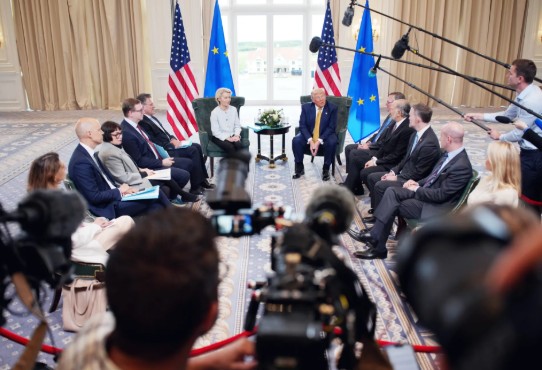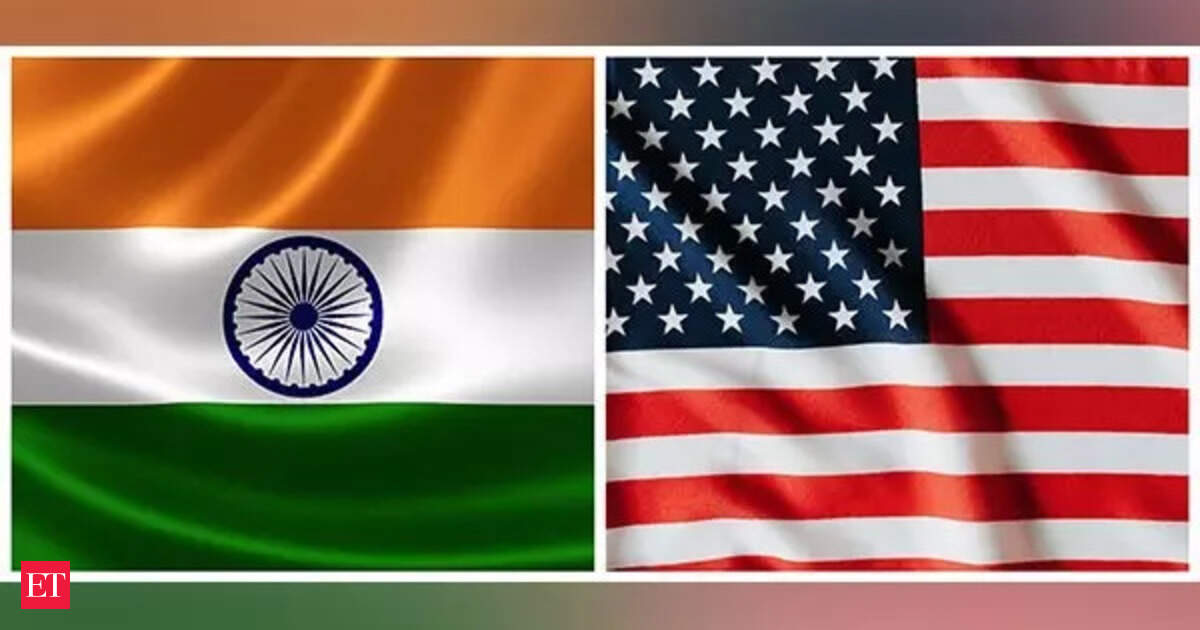Trump Forces EU to Commit $1.35 Trillion in Lopsided Trade Deal, Exposing Weakness
In a surprising turn of events, former President Donald Trump has successfully negotiated a trade deal with the European Union (EU) that has raised eyebrows and ignited debate over the bloc"s negotiating power on the global stage. Announced yesterday, the deal sees the EU pledging a staggering $1.35 trillion in investments and purchases from the United States, while securing only a modest 15% baseline tariff on its own exports to America. This outcome has been described by critics as an "unparalleled embarrassment" for the EU, highlighting its perceived ineffectiveness in leveraging its status as the world"s largest single market.
Background & Context
The EU, comprising 27 member states, has long touted its economic clout as a significant force in global trade negotiations. However, this latest deal raises questions about its ability to assert itself against American demands. The agreement includes a commitment from the EU to invest $600 billion in the U.S. economy and make $750 billion worth of strategic purchases, particularly in energy and military supplies, over the next three years. In return, the EU has agreed to eliminate its own tariffs entirely while accepting a 15% baseline tariff on its exports to the U.S., a stark contrast to the previous threat of 30% tariffs that Trump had floated.
Key Developments
As EU Commission President Ursula von der Leyen attempted to present the deal as a positive outcome, Trump seized the opportunity to critique European energy policies, particularly the reliance on wind energy. In a lengthy address, he dismissed wind energy as "the most expensive form of energy" and criticized the EU"s investment in windmills, claiming they degrade the beauty of the American landscape and pose environmental hazards. His remarks were not just a critique of energy policy but also a pointed jab at the EU"s broader political and economic strategy.
“They’re made in China, almost all of them,” Trump stated, emphasizing that the materials used in wind turbines pose significant disposal issues. “The whole thing is a con job. It’s very expensive.” His comments, delivered with characteristic bravado, underscored a growing perception that the EU"s emphasis on green energy initiatives may not only be economically unviable but also politically disadvantageous in the face of American demands.
\n\n
Image for Trump Forces EU to Commit $1.35 Trillion in Lopsided Trade Deal, Exposing Weakness
Broader Impact
The implications of this trade deal extend far beyond immediate economic figures. Analysts argue that Trump"s negotiation strategy has exposed fundamental weaknesses within the EU"s approach to foreign policy and trade. The inability of the EU to secure favorable terms in a deal that heavily favors the U.S. raises concerns about its effectiveness as a collective bargaining entity. Critics contend that the EU"s lack of unified geopolitical interests and overreliance on universalist principles have left it vulnerable to exploitation in negotiations with more assertive powers like the United States.
As noted by various commentators, the EU"s fragmented approach and internal divisions may have contributed to its failure to leverage its market size effectively. The deal not only solidifies Trump"s position as a formidable negotiator but also serves as a wake-up call for EU leaders to reassess their strategies and objectives on the global stage.
What"s Next
Looking ahead, the ramifications of this deal are likely to be felt across both sides of the Atlantic. For the EU, questions will arise regarding its future trade relationships and how it can reassert itself in negotiations with other major powers, including China and Russia. As previously reported, French President Emmanuel Macron has criticized the EU"s missed opportunity to leverage its single market against the U.S. deal, indicating a potential shift in European strategy moving forward.
Moreover, as the U.S. continues to assert its economic dominance, other nations may feel pressured to reassess their own trade agreements and policies in light of this unfolding scenario. With Trump’s administration now signaling a willingness to impose tariffs on foreign oil buyers, as highlighted by Senator Lindsey Graham, the landscape of international trade may be on the brink of significant transformation. The focus will be on how the EU adapts to these challenges and whether it can consolidate its position to safeguard its interests in an increasingly competitive global market.

Image for Trump Forces EU to Commit $1.35 Trillion in Lopsided Trade Deal, Exposing Weakness



![[Video] Gunfire between Iraqi security forces and Sadr militias in Baghdad](/_next/image?url=%2Fapi%2Fimage%2Fthumbnails%2Fthumbnail-1768343508874-4redb-thumbnail.jpg&w=3840&q=75)
